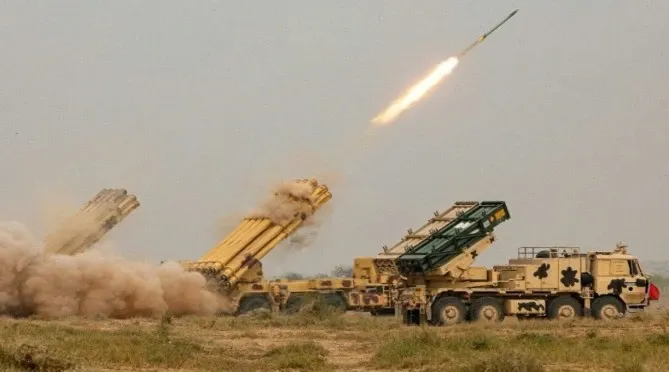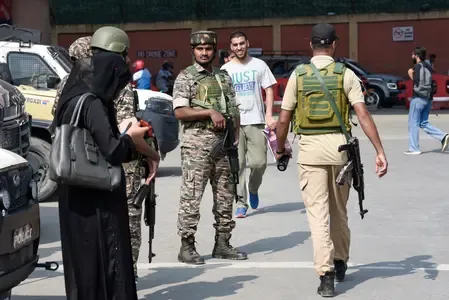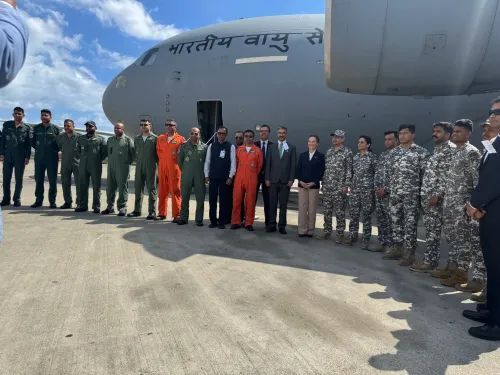Is There a New 'War' Beyond the Battlefield?

Synopsis
Key Takeaways
- Proxy wars are a significant threat in the modern geopolitical landscape.
- Covert operations and social media play crucial roles in shaping public opinion.
- AI is transforming the nature of propaganda and influence warfare.
- India's proactive measures are vital to countering external threats.
- Internal unity and strategic alignment are essential for effective response.
New Delhi: In the aftermath of the Cold War, the emergence of 'proxy wars' has introduced a novel approach to undermining adversaries without traditional military confrontations. This shift carries two significant implications.
Firstly, it involves orchestrated 'covert' acts of violence using terror organizations to engage in what is defined as 'asymmetric warfare', inflicting considerable damage on the enemy's combat capabilities.
The second implication expands the battlefield beyond conventional military engagements, targeting the opponent's economic stability, ensnaring the youth in the detrimental effects of narcotics, and executing a systematic campaign to tarnish the reputation of the targeted nation both domestically and internationally.
Terrorism, especially when fueled by faith-based motivations, has evolved into a pervasive threat to democracies worldwide.
While terror groups conduct covert operations, they now possess sophisticated arms previously exclusive to military forces. This transformation has occurred due to states like Pakistan openly employing 'Islamic Terrorism' as a tool of statecraft, particularly against India.
The rise of social media has accelerated a new form of propaganda warfare, where organized efforts shape narratives that erode trust in opposing regimes.
'Influence Operations' have become a crucial aspect of proxy warfare.
In 2020, Facebook dismantled a network of over 300 accounts managed from China, which disseminated content about the US elections and the COVID-19 pandemic, effectively countering the narratives presented by the ruling party and government.
Since then, AI-driven pro-China propaganda has steadily advanced, leveraging YouTube’s algorithms to generate and distribute content rapidly.
Comprehensive research, such as that conducted by the Australian Strategic Policy Institute (ASPI), has uncovered a vast network of YouTube channels promoting 'pro-China' and 'anti-US' sentiments in the English-speaking world.
The current disclosure requirements for sponsored content reveal significant gaps in addressing cross-border 'influence campaigns'.
Content creators often fail to disclose their identities, locations, and backgrounds.
The unregulated proliferation of AI-generated propaganda poses a threat to truth and the manipulation of real-world events.
AI-enhanced 'psy ops' can 'spoof identities', conduct mass surveillance, and automate disinformation dissemination.
India has ardently advocated for international regulations and monitoring of AI operations, emphasizing transparency in AI research to mitigate the risk of misuse as a strategic weapon while promoting its development for the common good.
Prime Minister Narendra Modi co-chaired the AI Action Summit in Paris in February 2025 with French President Emmanuel Macron, highlighting that India's AI strategy focuses on 'inclusivity, accessibility, and affordability'.
He noted that India has established a Digital Public Infrastructure (DPI) at minimal cost.
The Summit's theme centered on 'developing open AI infrastructure for social, economic, and environmental benefits'.
Given that videos are supported by extensive government frameworks, state-controlled media, and official amplifiers, China can easily disseminate its propaganda globally.
Funds are allocated to promote content created by influencers.
The Chinese Communist Party has mobilized diplomats and state media to propagate its narratives and drown out criticism using its network of obscure assets.
Reports indicate that traditional intelligence methods are employed by China's internet regulator to acquire media companies and engage foreign internet personalities to showcase the government's achievements in poverty alleviation, countering reports of forced labor in Xinjiang's cotton fields.
Even Chinese embassies across Europe and beyond have been instructed to disseminate propaganda on their Facebook pages.
India is cognizant of China's 'influence operations' and is enhancing its countermeasures.
In fact, India must be fully prepared for the actions of the Sino-Pakistan alliance in the realm of 'influence warfare'.
This anti-India strategic coalition has been active against India since the Pahalgam incident, beyond direct support from Turkey, Azerbaijan, and Malaysia, countries that harbor animosity towards the US and favor radical Islamic forces.
China has sought to align Iran with Pakistan and solidify its influence in Afghanistan.
Pakistan previously facilitated a 'give and take' arrangement between the Taliban-led Islamic Emirate of Afghanistan and Communist China.
China backs Pakistan on the Kashmir issue due to its strategic interests in Pakistan-occupied Kashmir, as the China-Pakistan Economic Corridor (CPEC) traverses these northern regions.
China is now attempting to link CPEC with its Belt and Road Initiative (BRI) in Afghanistan.
Pakistan's Inter-Services Intelligence (ISI) has evidently intensified its terror campaign in both Kashmir and Punjab; the May 27 bombing in Amritsar is attributed to Babbar Khalsa International (BKI), known for its direct connections to the ISI.
India must remain vigilant regarding US-Pakistan relations as well as the collusive China-Pakistan alliance against India.
In the context of a desperate Pakistan reaching out to US President Donald Trump as it faced challenges due to India's robust retaliatory actions following the Pahalgam terrorist attack, it appeared Trump showed some interest in Pakistan as a potential trade partner without compromising India's strategic interests.
India's diplomatic capabilities will be put to the test in navigating the complex US-India-Pakistan dynamics—this should not pose a significant challenge as long as President Trump maintains a 'de-hyphenated' approach towards India and Pakistan.
Trump's inherent disdain for 'Islamic terrorism' should work to India's advantage.
Returning to the 'influence operations' of the Sino-Pakistan alliance, it is crucial for India to enhance its monitoring of social media—this effort is already underway—to identify any 'proxy warfare' initiatives emerging from these platforms and develop ongoing countermeasures.
This requires a coordinated response from the nation's security and political leadership, as the counteractions must encompass diplomatic, trade, and military strategies for a comprehensive approach.
Prime Minister Modi has established that such a response will be grounded in zero tolerance for terrorism, fostering mutually beneficial economic relations with the US, and committing to the holistic development of India that ensures no one is left behind.
The recognition from both the US and Russia of India as an emerging world power, unaligned in a potential resurgence of Cold War tensions between the US and a China-led axis that includes Russia, provides India with newfound strength.
However, India's internal management presents a greater challenge than its international relations, primarily due to a lack of strategic alignment between the ruling party and the opposition, coupled with persistent domestic discord over caste, creed, and regional issues. This situation demands prompt understanding and resolution.
(The writer is a former Director of the Intelligence Bureau. Views are personal)









